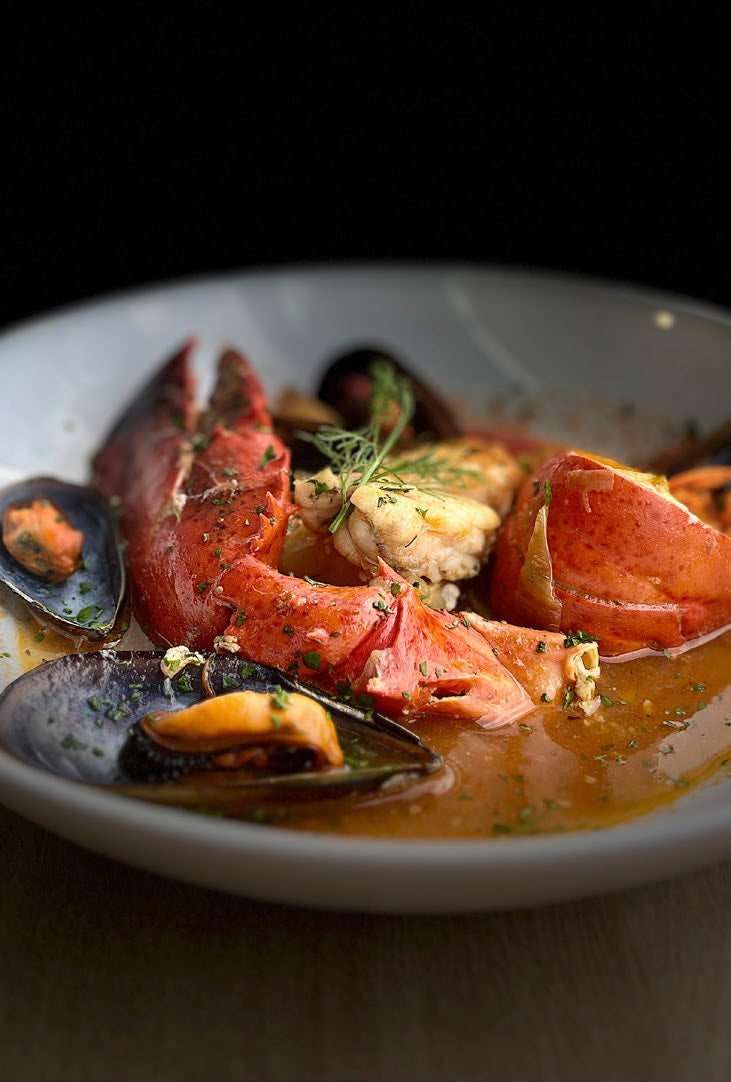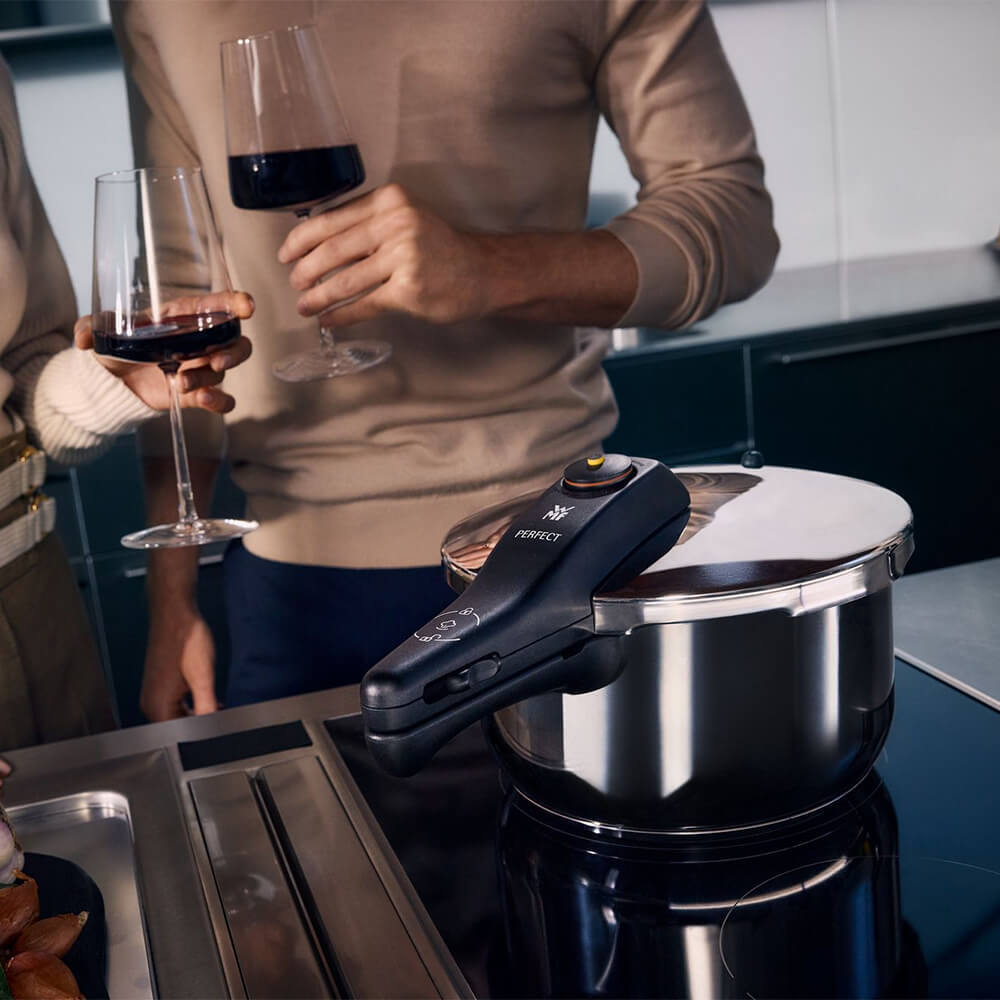Are you looking for a special recipe for the holidays or for a special celebration? Nothing beats the pleasure of sharing a lobster bouillabaisse soup with your loved ones, and prepared in a pressure cooker you will have it ready in no time! This Mediterranean recipe, full of flavours of the sea and comforting aromas and whose origins date back to the Provence region in France, has crossed generations while maintaining its essence: an exquisite combination of fish, fresh seafood and aromatic herbs .
Bouillabaisse soup is renowned for its intense flavours and long, traditional preparation. However, for those looking to enjoy this iconic dish without spending hours in the kitchen, the pressure cooker becomes an invaluable ally: today we prepare this recipe in the WMF Perfect pressure cooker . With this tool, cooking time is noticeably reduced ( up to 65-70% less! ), allowing you to savour the essence of bouillabaisse soup in much less time – ideal for busy Christmas celebrations.
The essence of Bouillabaisse Soup
Bouillabaisse soup has its origins in local fishermen in the 18th century, who used the various fish and seafood of the day to create this recipe. Over time, bouillabaisse became an icon of Mediterranean cuisine, fusing fresh ingredients with authentic flavours. The traditional version includes lobster as a key ingredient, but the versatility of this soup allows for adaptations with lobster, shrimp or firm fish, always maintaining its seafaring essence.
Variations and Adaptations: The Versatility of Bouillabaisse Soup
Bouillabaisse soup is more than just a recipe, it's a platform for culinary creativity. In addition to seafood variations, you can adjust the herb and spice content to create a more intense or subtle soup according to your taste. Prefer a spicy kick? Add some pepper or a pinch of paprika. Looking for a more pronounced aroma? Increase the aromatic herbs such as thyme, rosemary or tarragon.
Get ready to enjoy an unforgettable gastronomic experience during these holidays with a lobster bouillabaisse soup prepared in a pressure cooker!
 Ingredients
Ingredients
- 2 lobsters of 500g each (approx)
- 400 g monkfish tail, cleaned, skinned and cut into slices
- 500 g fresh mussels
- 1 leek (white part only)
- 1 onion
- 3 cloves of garlic
- 500 g fresh fennel
- 250 g crushed tomatoes (without skin, seeds or juice)
- 500 ml fish stock
- a few strands of saffron
- 2 sprigs of chopped parsley
- 1 bay leaf
- 1 sprig of thyme
- Oil
- Salt
Preparation
- Cut the heads off the lobsters, cut the tails into slices and remove the claws, breaking the claws a little. Then, cut the heads in half lengthwise and remove the stomach.
- Cut the monkfish into not too large portions or slices and season to taste.
- Cut the white part of the leek into thin slices, chop the garlic cloves, dice the onion and finely chop the fresh fennel.
- Heat a frying pan over high heat and, when ready, add a splash of oil. Brown the monkfish pieces and set them aside. In the same pan, continue with the lobster pieces until they turn red and set them aside.
- Add the prepared vegetables to the same pan and sauté over medium heat for a couple of minutes. Then add the crushed tomatoes and stir.
- Finally, add the saffron, parsley, bay leaves and thyme. Pour the entire contents of the pan into the WMF Perfect pressure cooker over medium-high heat.
- Add the fish stock to the pot and stir.
- Place the mussels in the steamer basket and, when the contents of the pressure cooker begin to boil, insert the loaded basket. Cover, but do not close the lid. Cook for 2 minutes to open the molluscs, remove the lid from the pot and remove the basket with the opened mussels, set them aside.
- Close the pot and cook over medium-high heat until the pressure indicator shows its second ring (in the PERFECT PREMIUM model, set the handle selector to position 2). Then reduce the heat to minimum and cook for 5 minutes.
- After 5 minutes, turn off the heat and let the WMF pressure cooker reduce for 15 minutes, until the cooking rings are no longer visible and you can open the cooker.
- Depressurise and open the pot; add the reserved mussels, monkfish and lobster without mixing. Close the pot again, turn up the heat until the pressure indicator shows its first ring (in the PERFECT PREMIUM model, set the selector on the handle to position 1). Remove the pot from the heat and let it rest until the cooking rings are no longer visible and you can open the pot again.
- Serve immediately.

























Comments
Luis said:
Tiene toda la razón David, se hace con lo que se llama morralla, peces muy espinosos, pequeños, inservibles para su comercialización salvo para hacer un fumet de muerte, asunto que merecería aparecer en la receta (cómo hacer el caldo de pescado) aunque la bullabesa es en sí misma un fenomenal caldo de pescado. Solo una aportación más, en lugar de croutons, mejor unos picatostes con rouille (con los hígados del pescado) o una versión sencilla con alioli, flotando en la sopa humeante a la que en algún momento habría que poner Pernod que refuerce el sabor anisado del hinojo.
Antonia said:
Gràcies David per l’aportació. Bona!
David said:
La cocina tradicional, no emplea productos de lujo, como bogavante (homard) o rape (lotte). La ‘bouillabaise’ se hace con pescado digamos barato, y para alargarla y darle consistencia, se le ponen ‘croutons’ (dados de pan tostado frotados con ajo) el resto es fantasía. Los platos ‘marineros’ se hacen con pescado barato, y se le añaden patatas o judias, para ‘hartar’. La ‘zarzuela’ o ‘Sarsuela’, es un plato de rico, y no lleva ni patatas ni judias, sólo pescados y mariscos ‘nobles’ por llamarlo de alguna manera.
David said:
La cocina tradicional, no emplea productos de lujo, como bogavante (homard) o rape (lotte). La ‘bouillabaise’ se hace con pescado digamos barato, y para alargarla y darle consistencia, se le ponen ‘croutons’ (dados de pan tostado frotados con ajo) el resto es fantasía. Los platos ‘marineros’ se hacen con pescado barato, y se le añaden patatas o judias, para ‘hartar’. La ‘zarzuela’ o ‘Sarsuela’, es un plato de rico, y no lleva ni patatas ni judias, sólo pescados y mariscos ‘nobles’ por llamarlo de alguna manera.